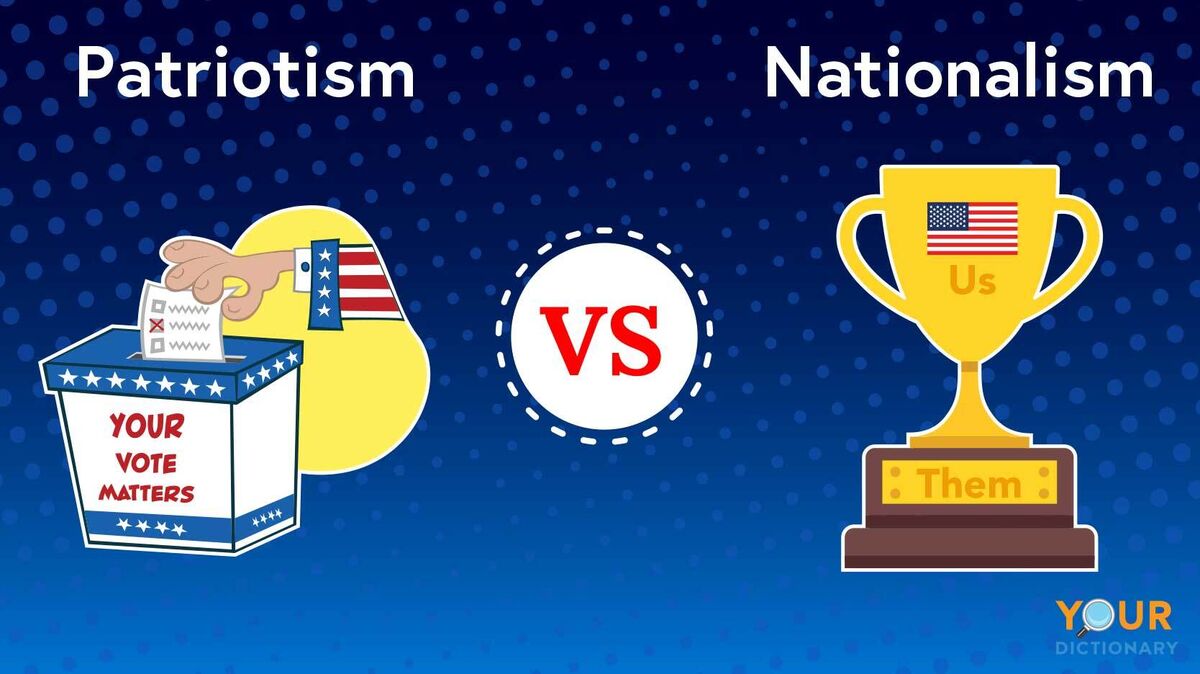
People sometimes use the words "patriotism" and "nationalism" as if they mean the same thing. They do not. At the most basic level, patriotism is a form of national pride. The phrase "national pride" isn't that far off from the word "nationalism," but these words are worlds away in terms of meaning. Discover the differences between patriotism vs. nationalism.
What Does Patriotism Mean?
There are records of the English word patriotism being used as far back as the 17th century. The term derives from the Latin word patriota, which means "fellow countrymen," paired with the suffix -ism. Adding -ism to a word creates a related term that refers to a particular philosophy or way of thinking or acting. Therefore, the term patriotism refers to the pride, loyalty and love a person feels for his or her own country. It is a form of national pride.
People sometimes express patriotism verbally or via symbols that represent the country. A person who is patriotic feels strong support for his or her country and government as a whole, yet remains open to acknowledging problems or wrongs that may need to be righted. There are many examples of patriotism in history and modern times.
What Does Nationalism Mean?
Don't mistake national pride for nationalism. Nationalism has some elements in common with patriotism, but it is not the same. The term nationalism has only been used since the late 18th century, during which time it was used interchangeably with the word patriotism. However, over time, the words have evolved to mean different things. Nationalism is grounded in positive feelings and loyalty towards one's own country but also espouses the belief that one's own country is always better than others.
Rather than being a philosophy or way of thinking, nationalism has come to often be associated with a political approach in which a particular group seeks to establish their cultural practices or beliefs as the country's official governmental policies. One example is what is being called Hindu Nationalism in India, even though the country's government is officially secular. There are many examples of nationalism around the world.
- Nationalistic beliefs are based on the idea that one's country is better than all of the other countries, without exception.
- Such beliefs can lead to intolerance and isolation, along with an unwillingness to recognize problems with the way things are.
- Nationalism is a form of ethnocentrism, which is a belief that your country's way is always the best way, in every circumstance.
- In the most extreme cases, nationalism becomes a form of parochialism, in which people believe that their country's way is the only acceptable way.
- Nationalism can also lead to xenophobia, which is an irrational hatred or fear of people or cultures that are (or are perceived as) foreign or different.
Understanding the Difference: Patriotism vs. Nationalism
While patriotism and nationalism are both rooted in pride for a country, these concepts differ in important ways. The nationalist's mindset is my country, right or wrong, whereas someone who is patriotic without also being a nationalist remains proud of his or her home country without insisting that every other country is bad or wrong.
- A patriotic person can appreciate and value cultural differences, while a true nationalist would believe that others' cultural beliefs or practices are inherently bad, wrong, or at least worst than their own.
- To exhibit patriotism, a person does not need to denigrate other countries or cultures. Nationalism involves building up one's own country or culture by denigrating other countries or cultures.
- An individual can be patriotic without believing that they're better than other people just because of what country they were born in. Those with nationalist beliefs believe that their country of origin makes them superior to people from other countries.
- A person can be patriotic, yet recognize that another country may have a strength that theirs does not. A nationalist will insist that their country is always best or right.
- Patriotism can lead people to recognize the benefits of working in cooperation and collaboration with other nations. Nationalism leads to an isolationist approach that involves severing ties with other nations or multinational entities.
- Those who see the world through a patriotic lens recognize the benefits of adapting, evolving and growing as a country's population changes, while those who view it through a nationalist lens want to keep things the way they were to start with (as they perceive that to be the best/correct way).
- A patriot can recognize that past government policies and practices might have been discriminatory and work to improve things, yet still feel proud of being a citizen. Nationalists focus more on maintaining the status quo because they're not willing to see their country might have been in the wrong.
Navigating the Difference
Now that you understand the difference between patriotism and nationalism, you can make an informed decision about where you stand and what your beliefs really are. It's important not to use the term nationalism when what you really mean is national pride or patriotism (and vice versa). Now that you're clear on the meanings of these terms that are closely related to politics and government, take the time to learn more about these topics. Start by adding some political jargon to your vocabulary. Then, explore different types of democracy.